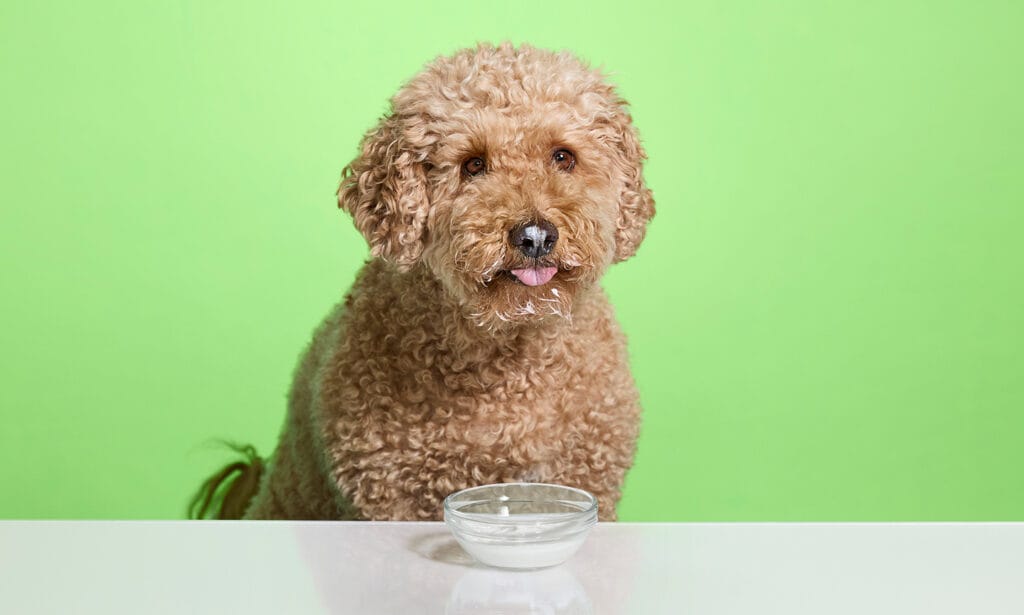Yogurt is just as tasty as it is healthy. It can be enjoyed on its own, paired with countless delicious fruits, as an ingredient in a refreshing smoothie—the list goes on. But can dogs eat yogurt too?
We talked with veterinary experts to get the scoop on whether dogs can have yogurt, including the potential health benefits and risks, which types of yogurt are dog-friendly, how to safely feed it to your pup, and more.
Always check with your veterinarian before introducing any new food into your dog’s diet.
In This Guide:
Can Dogs Have Yogurt?
It depends. Some types of yogurts are safe for dogs to eat, while others can pose health risks.
If you’re considering giving your canine companion yogurt, it should be plain, unsweetened, and free from flavorings, sugar, or artificial additives, like xylitol, which is toxic to dogs, says Marc Smith, DVM, MS, at Natchez Trace Veterinary Services in Nashville, Tennessee.
Whether your dog can safely eat yogurt also depends on if they can tolerate dairy in small amounts on occasion. (Yes, our furry friends can be lactose intolerant too!)
Is Yogurt Good for Dogs?
Yogurt can be a healthy snack for dogs when served in moderation—and as long as it’s plain, unsweetened yogurt without artificial additives or excessive sugar.
A few health benefits of yogurt include:
- It’s packed with probiotics. Probiotics are beneficial bacteria that promote a healthy gut microbiome. A balanced microbiome supports proper digestion, nutrient absorption, and a strong immune system, Dr. Smith says. They may also help dogs with occasional digestive upset or diarrhea.
- It’s rich in calcium. This essential mineral helps build strong bones and teeth, which are key to an active lifestyle and a happy, healthy pup.
- It’s a good source of nutrients. Yogurt contains beneficial nutrients, such as protein, zinc, and B vitamins—all of which contribute to overall health, says Nina Griffin, DVM, medical director of Veterinary Emergency Group (VEG) Lynnwood in Lynnwood, Washington.
Is Yogurt Bad for Dogs?
As with other human foods that dogs can eat, there are a few considerations to keep in mind before feeding yogurt to your pooch.
According to our experts, possible risks of dogs eating yogurt include:
- Digestive upset: Lactose intolerance is common in dogs, which can cause difficulties digesting dairy products such as yogurt, ice cream, and cheese. This may lead to symptoms, including diarrhea, gas, vomiting, or bloat. Additionally, dogs with sensitive stomachs or underlying conditions, like pancreatitis, may react negatively to the fat in full-fat yogurt, Dr. Smith says.
- Unwanted weight gain: Yogurt has its health benefits. Still, overfeeding it can lead to an imbalance in the diet, potentially causing weight gain due to its calorie and fat content, Dr. Smith says.
- Potentially toxic ingredients: Certain types of yogurt can contain dangerous ingredients, like artificial sweeteners in sugar-free varieties, for example. Always check the ingredients list to make sure the product is dog-friendly, and doesn’t contain xylitol or any of its other names—like birch bark extract, birch sugar, or wood sugar. Yogurt containing xylitol can cause serious health problems in dogs, like low blood sugar, seizures, and liver failure. If ingested, seek emergency veterinary care immediately.
When first feeding yogurt or any other new, dog-friendly human food, give it in small amounts and monitor for adverse reactions.
Signs to watch for include:
- Bloating
- Diarrhea
- A tense stomach
- Abdominal discomfort
- Excessive gas
- Decreased appetite
If you notice any of these signs in your dog, Drs. Smith and Griffin say it’s best to stop feeding yogurt and consult your vet.
In rare cases, if a dog consumes a large amount of yogurt or has severe lactose intolerance, it could lead to a more serious reaction, such as dehydration from persistent diarrhea or vomiting, Dr. Griffin says.
Seek immediate veterinary care if you notice signs of severe bloating, lethargy, or an inability to keep food down.
What Kind of Yogurt Can Dogs Eat?
Want to share a small dollop of yogurt with your canine companion? Before doing so, find out which types are OK for your doggy to indulge in.
Dog-friendly types of yogurt include:
- Plain, unsweetened non- or low-fat yogurt
- Plain, unsweetened non- or low-fat Greek yogurt
Types of yogurt that aren’t safe for dogs to eat and should be avoided include:
How Much Yogurt Can My Dog Eat?
While yogurt is a nutrient-packed food, it’s still considered a treat for our furry friends. Treats should make up no more than 10% of your dog’s diet. The rest of their daily caloric intake should come from a complete and balanced diet.
Dr. Smith shares a general feeding guideline of how much yogurt to give your dog based on their size and weight. Serving sizes will also vary depending on your dog’s tolerance for dairy.
It’s always a good idea to consult your vet for personalized recommendations based on your dog’s specific needs, especially if they have dietary restrictions or health concerns, says Dr. Smith.
Extra-small dogs (2–10 pounds)
Up to 1–2 teaspoons
Small dogs (11–20 pounds)
Up to 1 tablespoon
Medium dogs (21–50 pounds)
Up to 1–2 tablespoons
Large dogs (51–90 pounds)
Up to 2–3 tablespoons
Extra-large dogs (91+ pounds)
Up to 3–4 tablespoons
How To Safely Feed Yogurt to Your Dog
Dr. Smith recommends feeding yogurt in small portions, such as 1 teaspoon for small breeds or 1 tablespoon for larger breeds, to make sure they tolerate it well.
If your pooch’s stomach agrees with it, try these tips from Dr. Smith on how to safely feed yogurt to your dog:
- Serve as a stand-alone treat. Plain, unsweetened yogurt and plain Greek yogurt can be served on their own for a delicious and nutritious snack that requires no prep.
- Freeze it. For a fun twist, freeze yogurt in small silicone molds for bite-size frozen treats, or mix it with dog-safe fruits like blueberries, bananas, or pureed pumpkin for added nutrients. You can also stuff yogurt into a KONG toy or spread it on a lick mat!
- Use it as a food topper. A small amount of yogurt can be a tasty topper for daily meals or mixed with chopped fresh veggies, like carrots, for an extra boost of flavor and nutrition.
- Make a smoothie-style treat. Blend yogurt with water or bone broth, and freeze it into ice cube trays. Avoid combining yogurt with ingredients toxic to dogs, such as chocolate, raisins, or sugary syrups.
- Make homemade frozen yogurt. Dogs can enjoy frozen yogurt, too, as long as it’s homemade using plain yogurt and dog-friendly fruits.
FAQs About Dogs and Yogurt
Q:Can dogs eat Greek yogurt?
A:Yes! Dogs can eat Greek yogurt as long as it’s plain and unsweetened.
Q:Can a dog get diarrhea from eating Greek yogurt?
A:Yes, some dogs may get diarrhea from eating Greek yogurt. While it has less lactose compared to regular yogurt, it’s always best to feed any dairy products in small amounts to see if your pup can tolerate it.
Q:Can yogurt upset a dog's stomach?
A:Yes, yogurt can upset a dog’s stomach, especially if they eat it in large amounts or are sensitive to dairy.
Q:Can dogs eat vanilla yogurt? Can dogs eat strawberry yogurt?
A:No, dogs should avoid eating flavored yogurts since they usually contain added sugars or artificial sweeteners—both of which can be harmful to dogs.
This content was medically reviewed by Teresa Manucy, DVM, Chewy veterinarian.
Share:











